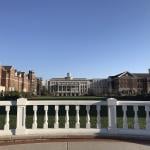San Diego, Calif., Jan 4, 2015 / 08:15 am (CNA/EWTN News).- Maura Byrne was terrified to go to therapy for the first time. She knew something was wrong, and she knew she needed help. But she didn’t know if she wanted to revisit the ghosts of her past, particularly with a therapist. “I was very reluctant to do it, there’s just such a stigma associated with therapy, and I didn’t know if I wanted to open up to someone,” she told CNA. A young woman from northern New Jersey, Byrne experienced her share of trauma in the past, including abuse, an eating disorder and a diagnosis of depression in college. After visiting the Institute of the Psychological Sciences in Arlington, Virginia, she was further diagnosed with borderline personality disorder and chronic post-traumatic stress disorder. “Them diagnosing me with those things was both hurtful but very helpful, because I knew something was wrong with me, but I didn’t know what it was, and I didn’t know how to fix it,” Byrne said. Once she reached out for help, Byrne realized she needed to continue with therapy, which she did for the next two years. And that was when the hard work, healing – and inspiration – began. She found a Catholic psychologist in Nashville, Tennessee, and within a matter of weeks transplanted her entire life from her home on the East Coast to the southern state in order to continue with counseling. It wasn’t easy. “I worked really hard, because therapy was really expensive and I was working as a baker and so I didn’t have health insurance, and so at times I worked up to three jobs to pay for the care that I needed,” she said. But the healing she experienced from her Catholic doctor was unlike any other doctor she had encountered. “He really challenged me to see beauty in my suffering, and therapy was very, very difficult, but at the same time very beautiful,” she said. “And when I was done with therapy, he said to me: ‘Everyone suffers, but it’s what someone does with that suffering that makes them a saint.’” That’s when the idea for Made in His Image was born. “He inspired me to start a ministry for women who have suffered the way I have, and to teach them about their dignity as daughters of God,” Byrne said. That was in September 2011. Byrne started travelling and speaking to high school and college aged women about their inherent beauty and dignity and daughters of God, and she started reaching out to them through a blog and social media, writing about how much God loves them as Father despite anything they’ve been through. Currently, the Made in His Image Facebook page has over 26,000 likes. The website includes testimonials from women who have experienced healing through the ministry, as well as blog posts from various contributors on topics such as forgiveness, modesty, chastity, and recovery from various traumas like abortion and abuse. Byrne has even taken her testimony overseas, to Belize and Uganda, to help women there learn of God as a loving Father. “That’s three years of really hard work in the making,” she said. Getting started, she had no background in social media, and picked the brains of various friends who had wisdom to share. “The ultimate goal for Made in His Image is to be the first Catholic medical center in the world for girls suffering from eating disorders and abuse,” Byrne said. “There are Christian centers, but none that are Catholic, that’s the ultimate goal.” It’s a tall order for just one person. Byrne is hoping to expand her ministry staff to include at least a few more people, in order to field the thousands of e-mails she gets from women who have found Made in His Image. Those e-mails of women reaching out for help are also why Byrne recently quit her job as a baker to pursue this ministry full-time. One e-mail in particular made her realize she had a full-time task on her hands. “I received an e-mail from a young woman who… had planned on taking her life that night, but for some reason – she didn’t say the reason – she was just Googling around online and she found Made in His Image,” Byrne said. “She read all of our blog posts, and she said the reason she didn’t take her life was because of all the posts that she read, and she was told that she was loved on the blog posts.” In order to make the ministry sustainable after quitting her job, and to help Made in His Image reach its ultimate goal, Byrne launched a Go Fund Me campaign last month. “It was definitely a leap of faith,” Byrne said, “and I just live like month-to-month with my finances, which is not ideal at all, and to just to make this sustainable is really important.” Byrne said one of the biggest lies she wants to bust for women and girls is that they are not enough – not enough to seek the help they truly need, not enough to experience healing, not enough to believe they are beautiful and loved. “I want them to know about God the Father’s love, and how incredibly worthy they are, how incredibly enough that they are, and how God delights in them,” Byrne said. “Ultimately I want them to develop a personal relationship with God as Father, and to learn about their dignity as daughters of God.” Nearly every post on the website ends with a simple but loving: P.S. You’re enough. Byrne also tries to help young women get over the stigma of seeking out therapy and counseling. “I tell them, you know I think everyone should be in therapy at some point in their life, it’s so helpful,” she said. “If you were sick, you would go to the doctor, and you know, when we have things that we need to deal with, it’s so helpful to go and talk to someone who has that knowledge just like a medical doctor.” She also tells them that if they don’t like therapy the first time, they don’t have to go back. But almost always, once a woman starts counseling, she recognizes its value. “They know it’s really, really hard, but they really actually do like it.” Another thing she tries to help women and girls with is forgiveness and freedom from their past. Often, abuse comes from a family member, which can be very difficult to process. “Something that was really helpful to me to recognize and learn about was how we all have free will,” Byrne said. “I think it’s really easy when something traumatic or horrible happens, we think ‘If God loved us, he wouldn’t allow this to happen.’” “But if we know that person had free will, and God gives each of us free will, and we can either sin or do good with our free will, and the person who hurt them chose to do evil with their free will - it’s just really helpful to work through that process.” In situations of abuse, Byrne stressed that it is important for women to seek separation from the situation and holistic healing for themselves before considering reaching out to a family member who has been abusive. When the time comes, Byrne says it is essential to pray for the grace to forgive. “When you fail to forgive, you’re holding yourself hostage, and when you forgive them, you’re really setting yourself free, and it really comes down to that,” she said. “Ultimately, we are called to love like Christ, and when Christ hung on the cross, he loved those who were persecuting him.” The testimonials on Made in His Image’s website speak volumes for what the ministry has done for girls and women already: “I hadn't eaten in weeks. Then I read your blog and it gave me the resolve to fight again. Thank you.” “I listened to one of your live talks and it changed my life. Your passion is inspiring. I never knew going to therapy was okay, before you told me. Thank you for what you’ve done for me. Made in His Image is an amazing ministry, it saved my life.” “You are so honest and real and there’s so much hope in the way you write. I’m so happy to have found it. I’m amazed at what you’re doing. Your posts bring me a lot of comfort and hope. I’ve been struggling lately with so much … but today is the Triumph of the Cross…and it’s so perfect that I found your blog today. I’ll pray for you today. Thanks for everything you’re doing!” Byrne said that through the Holy Spirit, she hopes her ministry will continue to change hearts and save lives. “I just want to expose them to genuine, authentic love, and that is the love of God as Father,” she said, “and I really think the Holy Spirit will take over from there, and I really think their lives will be transformed.” To support Made in His Image ministries, click here: http://www.gofundme.com/mihimage Read more
















